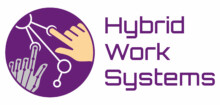HWS – Platform-based AI System for Human Motion Analysis to optimize Ergonomics of Hybrid Work Systems in Industry
HWS deals with the increasing levels of automation and the use of collaborative robots, making the shop floor a complex socio-technological system whose processes still need to be safe and secure for humans working in these environments. We take a human-centered view on the planning, analyzing and monitoring of industrial work processes.

Hybrid Work Systems (HWS) addresses interoperation in digital ecosystems where manufacturing companies are connected vertically, from the ERP system down to the shop floor and are also connected horizontally, e.g. via digital platforms offering shared services and secure data channels. HWS deals with the increasing levels of automation and the use of collaborative robots, making the shop floor a complex socio-technological system whose processes still need to be safe and secure for humans working in these environments. We take a human-centered view on the planning, analyzing and monitoring of industrial work processes and we argue that the methods developed would be transferable to other work situations as well, e.g. in care and health-related professions. However, HWS focuses on the industrial work place and the interface complexity of intra- and cross-company ecosystems.
In a current project the three research partners (Profactor, Salzburg Research and Fraunhofer Austria) have developed a research prototype that is capable of recognising basic gestures and utterances, and that can place these observations in a specific task model, e.g. for the assembly of an electric component. The task model then triggers e.g. assistive interventions by a monitoring system or it can orchestrate human-machine collaboration.
Hybrid Work Systems will leverage the experience of the MTM community with workers’ task modelling, to arrive at an extended and layered model of manufacturing activities that is able to formally describe assembly processes, assistive interventions, ergonomic improvement potentials as well as human/machine interaction in collaborative robotics.
For impact generation, Hybrid Work Systems will be integrated as a service with the H2020 project eFactory, a cloud-based, digital manufacturing ecosystem, thus leveraging the impact coming from a major pillar of the “Digitising European Industry” initiative.
Hybrid Work Systems brings together Fraunhofer Austria as experts for factory planning, workers’ assistance and MTM, Profactor as experts for video analysis in collaborative robotics and Salzburg Research as experts for Internet-based manufacturing service platforms and AI-based motion modelling and planning. The German MTM Association is bringing its unique expertise in research and use of MTM to the project. IMK- Automotive is a German SME specialising in factory planning tools including MTM and REFA. INNIO Jenbacher is a large manufacturing enterprise building large gas reciprocating engines, solutions for energy power plants and their motivation is to protect their workforce from injury and from poor ergonomics in the workplace. BRP Rotax is producing high performance combustion engines and has already a track record in using MTM for planning in production and logistics, as well as improving ergonomics in the work place. Hybrid Work Systems will lead to six technological achievements:
a) Integration profiles and Interface engines for hybrid human/machine processes
b) Motion analysis for industrial activity detection and segmentation
c) Semantic description of industrial processes as basis for integration and interfaces
d) System Interfaces for situation awareness model for human-machine cooperation
e) Integration of Interfaces for b) to d) to build a coherent assistive monitoring system
f) Integration and validation as services on European Industry 4.0 Platform – https://www.efpf.org/
Salzburg Research is coordinator of HWS and will develop semantic models of shop floor tasks, as well as ensuring the integration of the services into the European Factory Platform EFPF.


